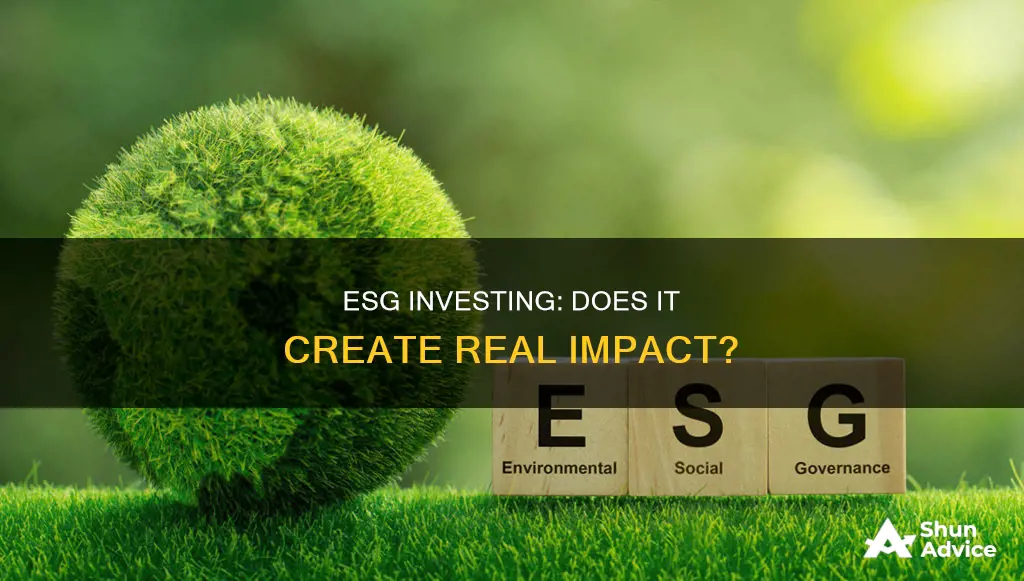
Environmental, Social, and Governance (ESG) investing is a form of sustainable investing that evaluates a company's or investment's sustainability. It is a way to build a more ethical portfolio by considering environmental, social, and governance factors to judge an investment's financial returns and its overall impact. However, despite its good intentions, there is a debate about whether ESG investing actually makes a difference. While some argue that it offers higher returns and helps fight climate change and social injustice, others claim that it might not be effective in improving companies' ESG performance and may even direct capital into poor business performers. With the growing popularity of ESG investing, it is essential to examine its potential impact and ensure that it aligns with investors' values and goals.
| Characteristics | Values |
|---|---|
| ESG funds' performance compared to traditional funds | A 2019 Morgan Stanley study found that from 2004 to 2018, the total returns of sustainable mutual and exchange-traded funds were similar to those of traditional funds. Other studies have found that ESG investments can outperform conventional ones. |
| ESG funds' performance during turbulent markets | The same Morgan Stanley study found that during turbulent markets, such as in 2008, 2009, 2015 and 2018, traditional funds had significantly larger downside deviation than sustainable funds, meaning traditional funds had a higher potential for loss. |
| ESG funds' performance during the COVID-19 pandemic | Of 26 sustainable index funds analysed by Morningstar, 24 outperformed comparable traditional funds in the first quarter of 2020. |
| ESG funds' performance in 2023 | ESG stocks are among the world's worst performers this year. |
| ESG funds' performance in the long term | ESG funds have the potential for high returns in the long term. |
| ESG funds' performance in Europe | In the fourth quarter of 2021, $143 billion in new capital flowed into ESG funds. As of December 2021, assets under management at global exchange-traded “sustainable” funds amounted to more than $2.7 trillion; 81% were in European-based funds, and 13% in U.S.-based funds. |
| ESG funds' performance in the U.S. | The Vanguard ESG U.S. Stock ETF (ESGV) has outperformed the broad U.S. stock market embodied by the diverse S&P 500 Index three out of the last five years. |
| ESG funds' performance and interest rates | Higher interest rates are impacting alternative energy companies' finances and pushing down valuations of ESG stocks. |
| ESG funds' performance and government policies | Government mandates are driving investment in alternative energy. |
| ESG funds' performance and private sector demand | Private sector demand has slumped due to higher borrowing costs for homeowners. |
| ESG funds' performance and tech companies | While many ESG indexes and index funds have recently outperformed broad indexes, they've done this partly because of the greater percentage of tech companies they contain. |
| ESG funds' performance and risk | ESG investing can help to mitigate risk. |
| ESG funds' performance and cost | Expense ratios for ESG funds are higher than other funds on average, so investors may be paying a slight premium. |
What You'll Learn

ESG investing may direct capital into poor-performing businesses
ESG investing may direct capital into poorly performing businesses. As of December 2021, assets under management at global exchange-traded "sustainable" funds with public environmental, social, and governance (ESG) investment objectives amounted to over $2.7 trillion, with 81% in European-based funds and 13% in US-based funds. In the fourth quarter of 2021 alone, $143 billion in new capital flowed into these ESG funds. However, despite the surge in popularity, ESG investing may not be making a significant difference in companies' actual ESG performance.
ESG investing is based on "single materiality", focusing on the impact of the changing world on a company's profit and loss rather than the other way around. This means that ESG ratings reward companies that are likely to profit from the climate crisis, not those doing the most to fight it. As a result, ESG funds may be directing capital towards businesses that are not effectively addressing environmental and social sustainability.
Furthermore, ESG funds often carry higher management fees, and there is a misconception that investors need to be willing to give up returns to invest responsibly. Higher interest rates can also make investments in alternative energy less attractive, impacting the finances of companies in the sector.
However, it is important to note that some studies have found that ESG investments can outperform conventional ones. For example, JUST Capital's index of the top 50% of companies in the Russell 1000 based on factors like fair wages and environmental protection returned 15.94% annually compared to the Russell 1000's 14.76%. Additionally, ESG funds have been found to consistently show lower downside risks than traditional funds, especially during turbulent markets.
Protecting Your Managed Investments: Strategies for Success
You may want to see also

ESG ratings reward companies likely to profit from the climate crisis
Despite the surge in popularity of ESG (environmental, social, and governance) investing, it may not be making a positive impact on the planet. As of December 2021, assets under management at global exchange-traded "sustainable" funds with ESG investment objectives were valued at over $2.7 trillion. However, it is suggested that ESG ratings, which underpin fund selection, reward companies likely to profit from the climate crisis, not those doing the most to combat it.
The ratings are based on "single materiality", which considers the impact of global changes on a company's profit and loss, rather than the other way around. This misunderstanding has been allowed to persist by asset management firms, as ESG funds are highly lucrative and carry higher management fees.
The issue with ESG investing is that it may give the impression that market forces alone can solve significant societal issues, such as climate change. However, only government intervention can effectively address the climate crisis. For instance, the European Green Deal, a package of initiatives to reduce greenhouse gas emissions and direct investment towards sustainability, was adopted in 2021. This is an example of concrete government action to address climate concerns.
Furthermore, investments in alternative energy have become less attractive due to rising interest rates, which affect the finances of these companies. As a result, alternative energy stocks have underperformed relative to traditional energy stocks in recent years, despite favourable trends in policy, adoption, and pricing. This highlights that ESG investing, as it stands, may not be sufficient to drive the necessary changes to combat the climate crisis.
Unraveling the Mystery of Dividend-Paying Equity Investments
You may want to see also

ESG funds have higher management fees
The market for ESG funds is relatively young, with a constant stream of new mutual funds and ETFs being launched. According to research by Fitz Partners, ESG funds remain cheaper than non-ESG products. However, funds that include "ESG" in their names often charge higher fees than their peers. The average asset-weighted expense ratio for US equity funds marketed as ESG funds was 34 basis points at the end of August 2022, compared to an asset-weighted average of 12 basis points for all US equity funds. The higher fees for ESG-labelled funds are partly due to them being more likely to be actively managed than non-ESG products, which include many large index funds.
In 2023, fees from ESG funds jumped by almost 400%, providing a much-needed boost to asset managers after a challenging 2022. The number of ESG-labelled fund products in Europe grew by 89% in 2023, while the gap between ESG and non-ESG management fee averages has narrowed to 2 basis points. On average, ESG-labelled equity fund management fees stand at 0.78%, compared to 0.80% for non-ESG funds. For bond funds, clean management fees for ESG funds average 0.50%, while non-ESG costs are slightly higher at 0.53%.
The higher fees charged by ESG-labelled funds do not always translate to bigger returns, better ESG scores, or higher sales. In fact, in an environment where energy holdings have been driving positive returns, sustainable funds, particularly those excluding oil and gas, have underperformed their peers. However, it is worth noting that ESG considerations have benefited portfolios. For example, in sample portfolios with 80% equity funds and 20% fixed-income funds, replacing all non-ESG products with the highest-rated ESG ones resulted in 3.8 percentage points higher returns over 12 months.
Strategic Investing: Maximizing a $400,000 Retirement Portfolio
You may want to see also

ESG investing may not be suitable for certain values
ESG investing is a way to build a more ethical portfolio, but it may not be suitable for certain values. While ESG investing considers environmental, social, and governance factors, it does not necessarily align with all investors' values.
For example, ESG ratings reward companies that are likely to profit from climate change, rather than those doing the most to combat it. This means that ESG investing may not be suitable for investors who prioritize climate action above all else. Additionally, ESG investing may not effectively address major societal challenges, as it relies on market forces rather than government intervention.
Furthermore, ESG investing may not always lead to positive planetary impact. The trillions of dollars invested in ESG assets are dedicated to assuring returns for shareholders, rather than delivering positive environmental and social outcomes. This misalignment between investor values and the reality of ESG investing can be problematic.
Another concern is that ESG investing may direct capital into poor-performing businesses. Close analysis suggests that ESG investing is not significantly improving companies' actual ESG performance and may even be channeling investment away from more sustainable businesses.
Finally, interest rates can impact the performance of ESG stocks. For instance, higher interest rates can affect the finances of alternative energy companies, making them less attractive to investors.
In summary, while ESG investing aims to align investment choices with personal values, it may not be suitable for investors with specific values, particularly those focused on climate action and societal impact.
Aramco IPO: Guide for Indian Investors
You may want to see also

ESG investing may not be suitable for certain sectors
Secondly, ESG investing is not designed to save the planet. Despite the historic surge in popularity, ESG investing will not tackle urgent environmental and social challenges. For example, it is estimated that to fight climate change, $3.5 trillion will need to be invested annually over the next 30 years. However, the trillions currently invested in ESG assets are dedicated to assuring returns for shareholders, not delivering positive planetary impact.
Thirdly, ESG investing is not making a difference to companies' actual ESG performance and may even be directing capital into poor business performers. As of December 2021, assets under management at global exchange-traded "sustainable" funds with ESG investment objectives amounted to over $2.7 trillion. However, this has not translated into significant improvements in ESG performance.
Finally, ESG investing may not be suitable for sectors that are not aligned with the values and principles of ESG. For example, the tobacco and alcohol industries may not be suitable for ESG investing due to their negative impact on health and well-being.
While ESG investing has gained traction as a way to build a more ethical portfolio, it may not be suitable or effective for certain sectors.
Mayo Clinic Endowment: Private Equity Investment Strategy
You may want to see also
Frequently asked questions
ESG stands for environmental, social, and governance. ESG investors aim to buy shares of companies that have demonstrated a willingness to improve their performance in these three areas.
ESG investing is a way to build a more ethical portfolio. However, there is some debate about whether it makes a significant difference to companies' actual ESG performance. Some argue that it may even direct capital into poor business performers.
Aside from having a more sustainable investment portfolio, ESG investing may offer the potential for high returns and lower downside risk during turbulent markets.
You can choose to create your own ESG investment portfolio or seek help from a robo-advisor or financial advisor. It's important to do your research and consider your values and investment goals when making ESG investment decisions.







